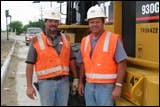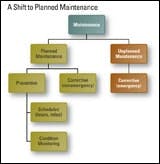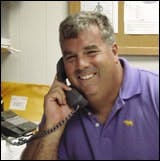Headquarters: New Orleans
Specialty: Highway-and-heavy construction, industrial
Equipment Value: $26 million
Fleet Makeup: 126 off-road units, 33 on-road vehicles — includes four asphalt-paving spreads and one concrete paving operation
Support Staff: 1 welder, 2 divisional equipment coordinators, 1 dispatcher, 1 craftsman
Facilities: None. All repairs are outsourced
Market Range: Louisiana
Barriere Construction won the 2004 Fleet Masters Award for its remarkable improvement in maintenance operations. But this year, equipment director Ben Tucker noticed slippage among some of the New Orleans contractor's benchmarks, set after a five-year maintenance-improvement process that began in 1999.
In 2000, Barriere implemented Total Process Reliability (TPR) to focus efforts on improvement. The impact was phenomenal (see "Barriere Builds Profit on Machine Maintenance," April 2004).
"Maintenance costs were reduced by 52 percent between 2000 and 2004," Tucker says. "Fleet utilization went from 51 percent to over 90 percent. With a major reduction in emergency (breakdowns) from 90 percent in 1999 to 8 percent in 2004, we made a choice to outsource maintenance totally."
After these considerable successes, however, Barriere's focus on maintenance excellence began to wane. The emergency-maintenance rate, which had dropped to less than 8 percent, had crept up to 15 percent in mid-2006. The percentage of preventive maintenance was dropping as well.
"Prior to Katrina we were growing significantly, causing us to bring on many new operators, supervisors and engineers," Tucker says. "We started to lose focus. Then Katrina came, and it was survival."
In response, Tucker decided to recharge the TPR process. Barriere reorganized its steering council to include a one-day training and planning session. One of the company owners, Bert Wilson, became a sponsor of the project and joined the council. "Bert became a major supporter for the change efforts," Tucker says.
Wilson took the reins to reinvigorate the TPR efforts across the company's four major divisions. Plant efforts and fleet efforts were coordinated through the steering council. A second equipment reliability coordinator was added to assist Tucker in coordinating maintenance and maintenance-improvement efforts.
Barriere started training newer supervisors and followed up with a series of one-day training sessions for operators called CLAIRE Workshops. The sessions focused on Cleaning, Lubricating, Adjusting, Inspecting, Repairing and Eliminating.
"It has truly brought the awareness up," Tucker says. "The machines are better cared for daily and weekly. For example, superintendents are now required to audit two machines a month. Recent audit findings showed 37 percent of the audited equipment needed lubrication, while 50 percent needed cleaning. We are getting there."
Barriere also implemented a Root Cause Failure Analysis (RCFA) program, and key personnel were trained to track down the causes of failures. Part of the plan was to decrease unplanned maintenance and shift more effort toward planned maintenance (see illustration).
Although the refocus efforts are only a few months old, Barriere is already seeing dividends. The emergency-maintenance rate, which had crept up to 15 percent, is now down to 6 percent, only one point off of the 2004 benchmark of 8 percent. Preventive maintenance schedule compliance, which had dropped to 56 percent, has rebounded to 76 percent. Utilization has improved to 90 percent, only 4 points below the target of 90 percent. RCFA compliance is at 100 percent. Percent preventive maintenance has improved from 38 percent to 42 percent, with opportunity to move to 60 percent, a world-class rate.
Tucker summarized the lessons learned the past few months. "If you don't stay focused on a process, you forget the reality of what you can accomplish."
Preston Ingalls is president/CEO of TBR-Strategies in Raleigh, N.C., and consults regularly on maintenance and reliability.






